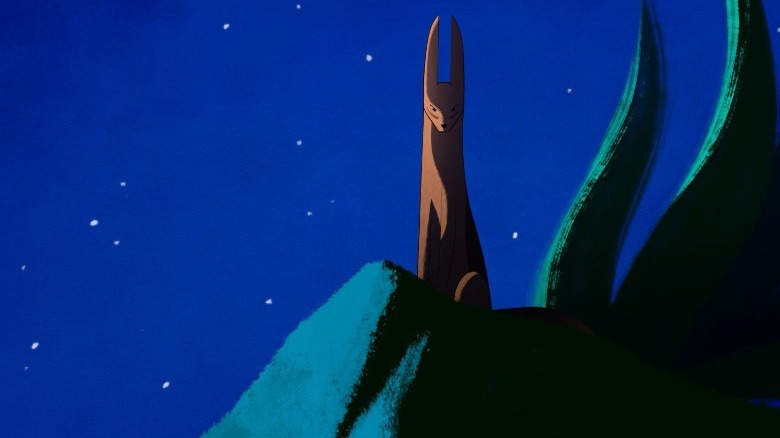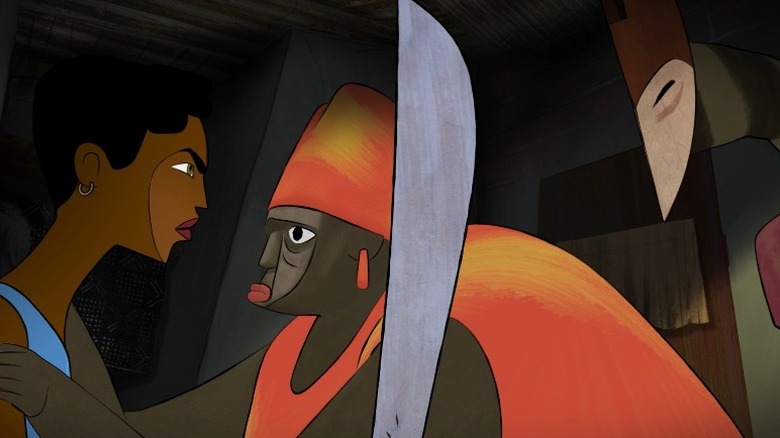Nayola Review: An Animated Spectacle On The Harrowing Effects Of War [London Film Festival]
A woman walks past the burning husk of a car. She looks out into a vast field, where a once peaceful valley is covered in dark clouds of smoke. Suddenly, the sounds of explosions and gunshots permeate the air. The woman is Nayola, on a seemingly impossible mission to find her husband in the wake of a civil war(?). She refuses to give up, traveling vast, dangerous landscapes to be reunited with her love. He was last reported as missing in action, but Nayola will not relent. She must find him.
This is Angola in 1995. "Nayola," a beautiful and visceral animated film, jumps between two timelines: 1995, in the heat of the war, and 2011, when the 25-year-long war is over. In 2011, the energy is completely different — there's a vibrancy in the air but a significant police presence keeps any real joy under the surface. The timeline follows Yara, a young woman and a passionate musician, who tries to get her music played wherever possible. Her rap is an ode to resistance, with spiky, clever lyrics that encourage standing up to authority. She's a fiery, delightful presence.
"Nayola" is consistently beautiful, but it occasionally suffers from an over-commitment to artistry over developing its story. There's an extended sequence in the middle of the film in black-and-white, which switches to a sort of hybrid between animation and live-action. It's striking, but it's also jarring, feeling more like an opportunity to make the film longer rather than establishing anything to inform its characters.
A harrowing depiction of war...
Even at 80 minutes, "Nayola" is far more invested in creating a feeling — a deep, moody, atmospheric work — rather than focusing on the plot. It's a decision that's mostly successful, but there are some stretches where things slow to a crawl. Thankfully, even when things slow down, the animation is constantly wonderful, delivering a great blend of both hand-drawn and computer-generated elements. It's also noting on a personal level, that I have no knowledge of the wars in Angola, and while the film is immersive and throws you into things, it doesn't give any context to those unfamiliar with the situation.
That isn't a problem though, and it feels purposeful. After all, people on the frontlines of war are far more concerned with navigating impossible circumstances and staying alive than they are than the geopolitical aspects of war. Not understanding the reasons is not a barrier to "Nayola." The film is more interested in the feeling — in the 1995 timeline, it's the horrors of war and the constant fear of being under attack, and the desperate fight for survival. In the 2011 timeline, it explores the generational impact: the intergenerational trauma and the collective experience of war. The question of who really suffers from declaring war is thoroughly examined in "Nayola," and when the film comes face-to-face with this difficult question, it shines especially bright.
"Nayola" is also keen to examine Angola's natural beauty. My eyes were drawn to the vast biodiversity, and some especially gorgeous creatures. It felt awful to see these beautiful things destroyed, but interestingly "Nayola" observes how the natural world can be every bit as brutal as the human world. Animals ruthlessly attack each other, and the film links people to nature, linked by our innate fight to survive. Nayola has a personal connection to nature inspired by Angolan myths — and while I'm unfamiliar with them, I was still moved by the film's raw energy and sumptuous animation. Even when I felt lost, the film's artistry kept me engaged.
These feelings of generational trauma are most keenly felt by Yara's grandmother Lelena, who lost her children in the war. Her pain is beautifully conveyed in the film's third act, where we get a look into her life and what she has lost. It's a moving portrait of the weight war carries on people decades after the dust has settled, and what it takes to finally be free from that torment — if such a thing is even possible.
...and the effects that linger
This is a special film — one deeply rooted in the history of the Angolan people but is accessible to those unfamiliar. It's immersive, throwing you into the heat of war and the plight of the Angolans. "Nayola" celebrates the passion and culture of Angola in the face of extremely difficult situations. One of the most striking scenes in the film comes when Nayola is searching for her husband and comes across an impromptu dance party in the rubble of a destroyed building. The people are happy, and carefree — but only for a moment, as the sounds of airplanes overhead have the crowd scrambling for their readily available weapons.
"Nayola" is frequently breathtaking, and creative, and its transitions between the two timelines are among the most striking moments I've seen. They suggest something that's very true to the spirit of the film — just because the war may be over, doesn't mean the fight doesn't rage on.
/Film Rating: 8 out of 10


